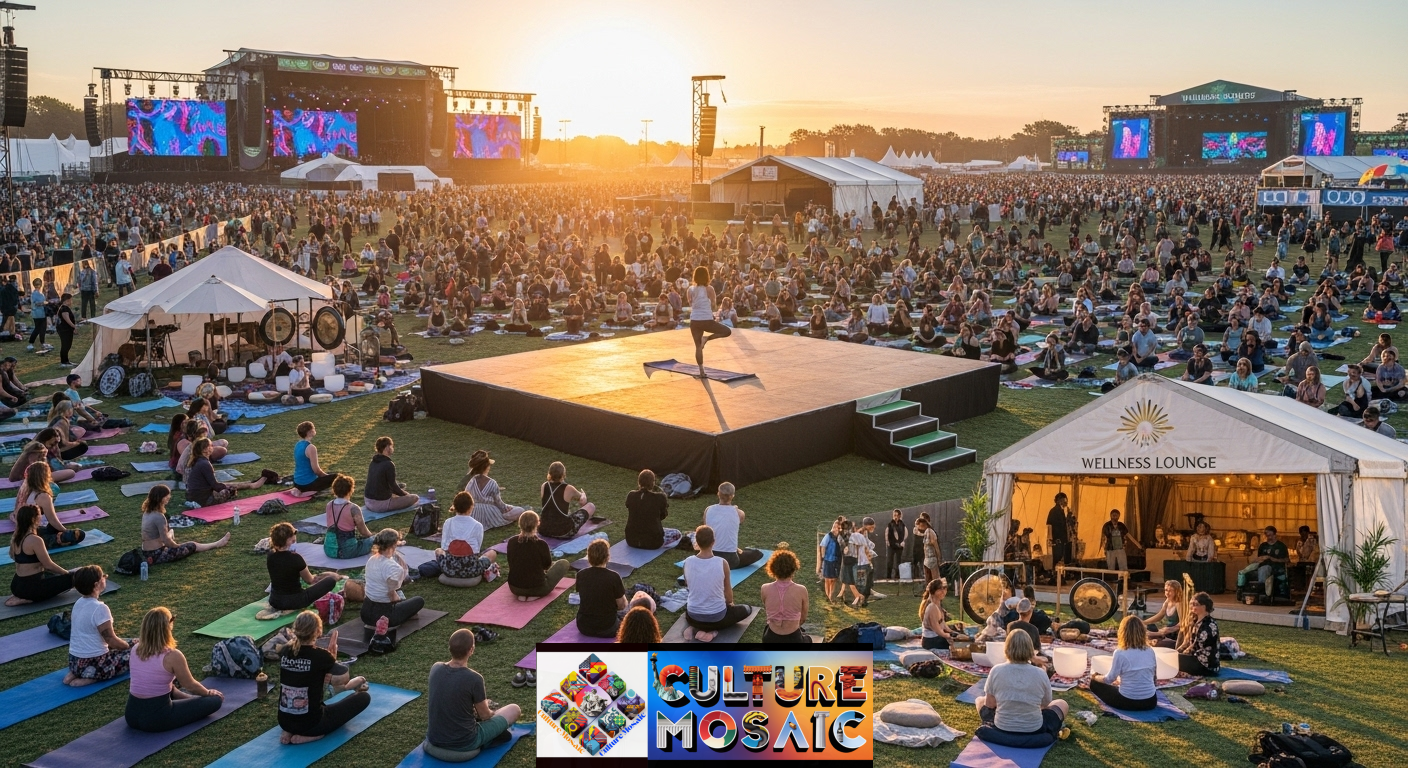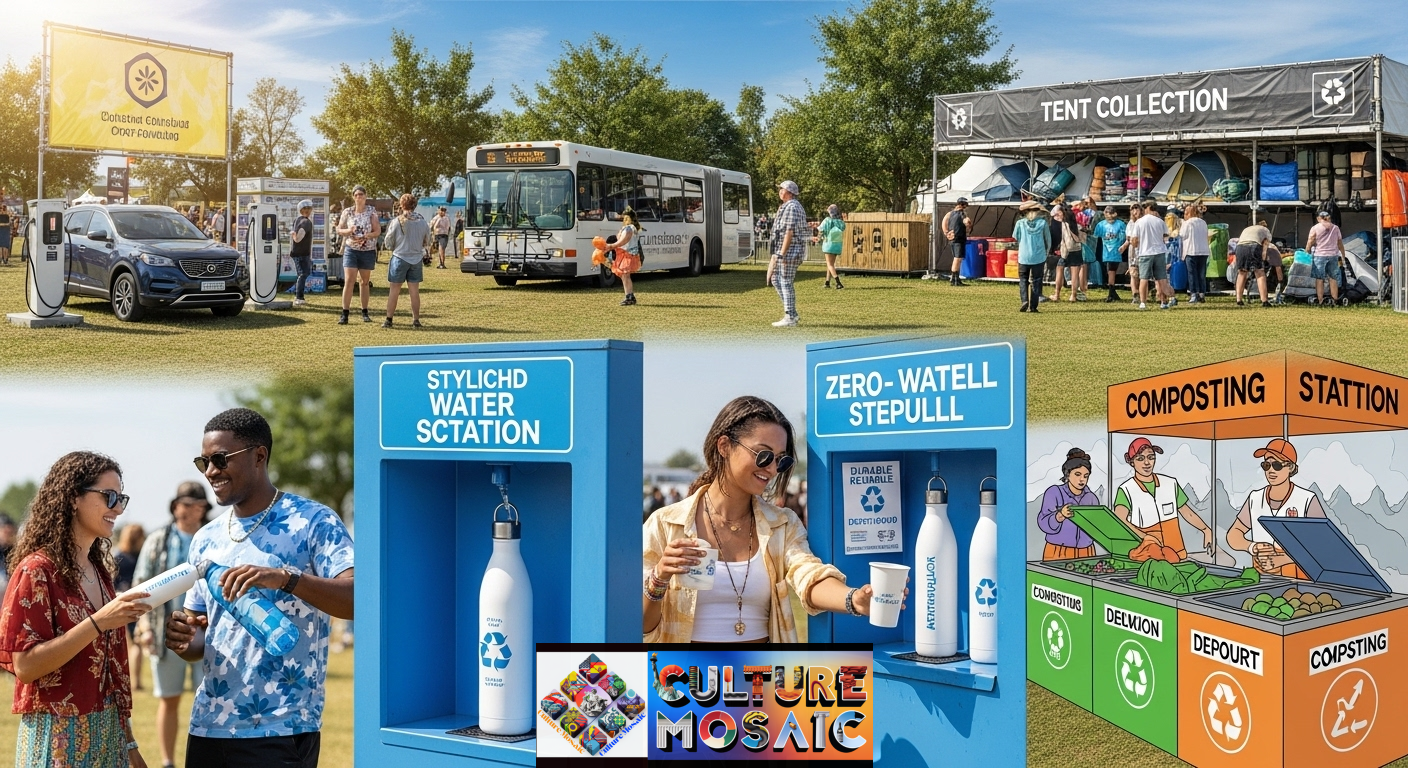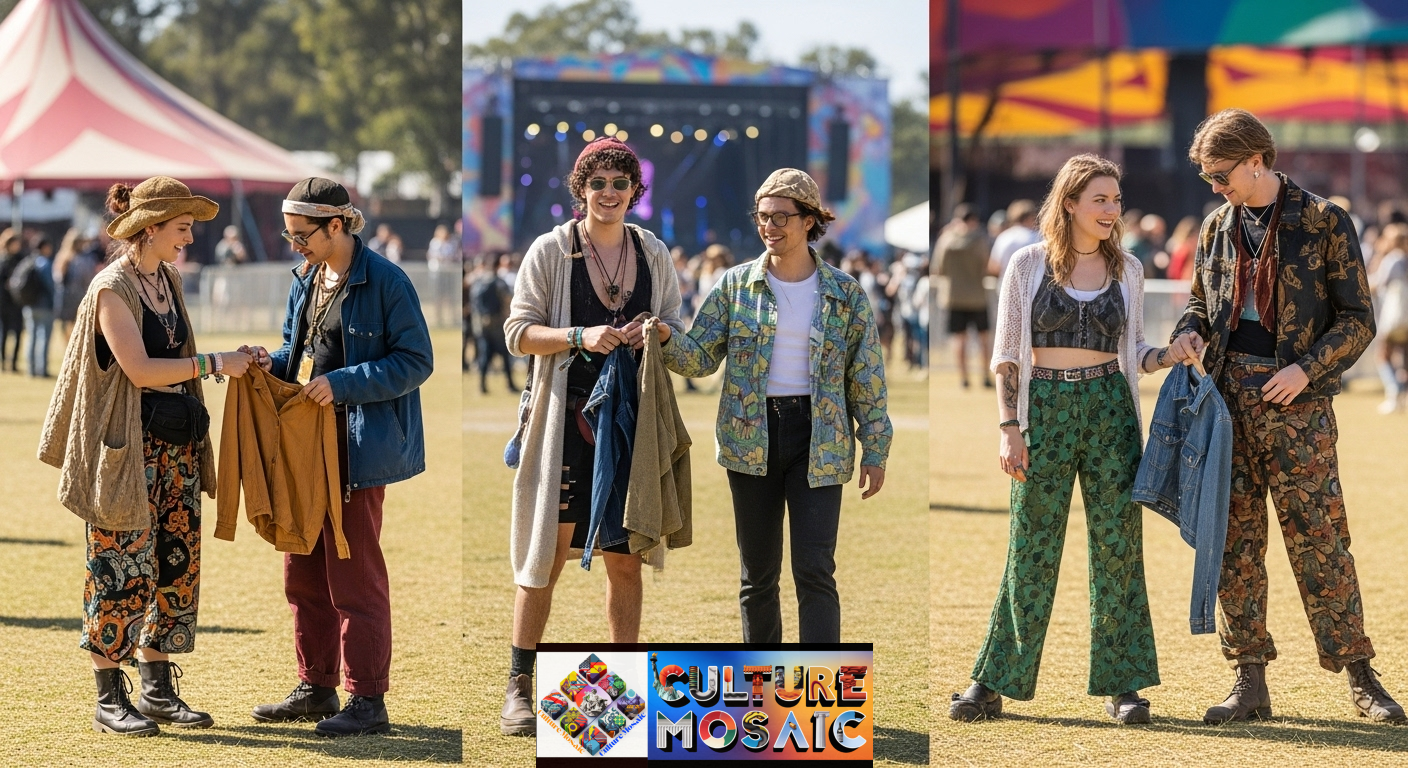Sustainable Festival Experience: The American festival landscape is undergoing a profound transformation. What was once synonymous with excess and indulgence has evolved into something far more intentional. Today’s festival-goers—particularly Gen Z—are redefining what it means to attend a music festival, prioritizing wellness, sustainability, and authentic connection over traditional party culture. This shift toward a sustainable festival experience isn’t just a passing trend; it’s reshaping the entire industry from the ground up.
The Cultural Shift Behind the Sustainable Festival Experience
Recent data reveal a striking change in festival attendance patterns. According to industry research, nearly 60% of Gen Z festival attendees report attending at least one sober or low-alcohol event in the past year. This demographic, now representing the largest segment of US festival-goers, is driving demand for experiences that align with their values around mental health, environmental consciousness, and personal wellness.
The traditional festival stereotype—characterized by late-night excess and environmental disregard—is being replaced by a more mindful approach. Attendees now expect festivals to offer meditation spaces alongside main stages, plant-based food options instead of just standard carnival fare, and comprehensive recycling programs rather than fields littered with single-use plastics.
This evolution reflects broader cultural movements. As climate anxiety intensifies and mental health awareness grows, young adults are making lifestyle choices that prioritize long-term well-being over short-term escapism. Festivals, as cultural touchstones, are adapting to meet these changing expectations.
Leading US Festivals Pioneering Sustainable Festival Experience Initiatives

Sustainable Festival Experience: Several major American festivals have emerged as leaders in sustainability and wellness integration, setting new standards for the industry.
Coachella has implemented extensive environmental programs, including solar-powered stages, comprehensive composting systems, and partnerships with local farms to reduce food transportation emissions. The festival’s “Outstanding in the Field” dining experience showcases local, sustainable cuisine, demonstrating that eco-consciousness and premium experiences can coexist.
Lightning in a Bottle in California has become synonymous with sustainability, requiring all vendors to use compostable materials and operating as a leave-no-trace event. The festival dedicates entire areas to workshops on permaculture, sustainable living, and environmental activism, integrating education seamlessly with entertainment.
Bonnaroo in Tennessee has introduced a “Clean Vibes Trading Post” where attendees can exchange recyclables for festival merchandise, gamifying sustainability efforts. The festival has also achieved zero-waste status for multiple consecutive years through aggressive composting and recycling programs.
Outside Lands in San Francisco partners with local environmental organizations and has eliminated single-use plastics across all vendor operations. Their “Wine Lands” and “Beer Lands” areas feature organic and biodynamic options, catering to health-conscious consumers who still want to enjoy beverages responsibly.
These festivals demonstrate that a sustainable festival experience doesn’t require sacrificing production quality or attendee enjoyment—it enhances both.
Wellness Programming: The New Festival Headliner

The integration of wellness activities into festival programming represents one of the most visible ways to create a sustainable festival experience. What began as fringe offerings has moved to center stage, with dedicated wellness areas becoming as anticipated as musical performances.
Morning yoga sessions now draw hundreds of participants before main stage performances begin. Sound healing workshops, meditation sessions, and breathwork classes appear on official schedules alongside artist set times. Festivals like SXSW have introduced “Wellness Lounges” offering massage, acupuncture, and mental health resources—recognizing that caring for attendees’ well-being is part of the festival’s responsibility.
The Conscious Festival Movement has influenced major events to create substance-free spaces where attendees can dance, socialize, and enjoy performances without alcohol or drugs. These “sober curious” zones aren’t positioned as punishment or restriction but as alternative social environments that prioritize clarity, connection, and presence.
Mobile apps for major festivals now include wellness schedules, allowing attendees to plan their days around both musical acts and self-care activities. This integration signals a fundamental shift: wellness isn’t an add-on; it’s a core component of the modern sustainable festival experience.
Zero-Waste Initiatives Transforming the Sustainable Festival Experience

Environmental sustainability has moved from optional consideration to an operational imperative. Festival organizers face increasing pressure from attendees, sponsors, and local governments to minimize environmental impact.
Practical measures being implemented include:
Tent and gear take-back programs that prevent thousands of pounds of camping equipment from ending landfills. Festivals like Hangout Music Festival partner with charitable organizations to collect abandoned tents and redistribute them to homeless communities.
Reusable cup systems eliminate millions of single-use plastic cups. Attendees pay a small deposit for durable cups, which they can return for a refund or keep as souvenirs. This simple system has reduced plastic waste by over 80% at participating festivals.
Composting infrastructure handles food waste on-site. Major festivals now employ composting teams that process food scraps into nutrient-rich soil, which is often donated to local farms or community gardens.
Water refill stations positioned throughout festival grounds make single-use plastic bottles unnecessary. Festivals encourage attendees to bring reusable bottles, with some offering branded options as merchandise.
Carbon offset programs calculate the festival’s total environmental impact—including attendee travel—and invest in renewable energy projects or reforestation efforts to balance emissions.
Electric vehicle charging stations and shuttle programs reduce transportation-related emissions, making it easier for attendees to minimize their carbon footprint.
These initiatives create a comprehensive approach to environmental responsibility, demonstrating that large-scale events can operate sustainably without compromising the attendee experience.
Plant-Based Food Revolution at Festivals

The food landscape at US festivals has undergone a dramatic transformation, reflecting a growing demand for sustainable and health-conscious options. Plant-based vendors now occupy prime real estate, and many festivals require a minimum percentage of food vendors to offer vegetarian or vegan options.
This shift serves multiple purposes. Plant-based food typically has a lower environmental footprint than meat-based alternatives, aligning with sustainability goals. It also caters to attendees’ dietary preferences and health priorities, with many festival-goers viewing food choices as inseparable from their overall wellness approach.
Festivals showcase local food vendors who source ingredients regionally, reducing transportation emissions while supporting local economies. Farm-to-festival programs connect attendees directly with the origins of their meals, creating educational opportunities about sustainable agriculture.
High-quality plant-based options have eliminated the perception that sustainable eating means sacrificing flavor or satisfaction. From gourmet vegan tacos to innovative plant-based burgers, festival food has become a highlight rather than an afterthought, contributing significantly to the overall sustainable festival experience.
Sustainable Fashion and Self-Expression at Festivals

Sustainable Festival Experience: Festival fashion has always been about self-expression, but the sustainable festival experience extends to what attendees wear. The environmental costs of fast fashion have sparked a movement toward secondhand, vintage, and sustainably produced clothing.
Gen Z festival-goers increasingly shop at thrift stores or participate in clothing swaps to create unique festival outfits. This approach simultaneously reduces environmental impact and ensures more authentic individual expression, as mass-produced festival fashion loses appeal.
Some festivals have introduced on-site clothing swaps or repair stations where attendees can fix damaged items rather than discarding them. These initiatives promote circular economy principles while fostering community interaction.
Sustainable fashion brands partner with festivals to showcase eco-friendly materials and production methods. Attendees learn about organic cotton, recycled polyester, and natural dyes, connecting their fashion choices to broader environmental values.
This shift represents more than aesthetic preference—it’s a fundamental rethinking of consumption patterns. The sustainable festival experience encompasses everything from what attendees eat to what they wear, creating consistency between values and actions.
The Sober Curious Movement at US Festivals
Perhaps no change illustrates the shift toward a sustainable festival experience more clearly than the growing “sober curious” movement. This isn’t about abstinence or recovery—it’s about intentional choices around substance use, prioritizing mental clarity and authentic connection.
Statistics reveal this trend’s significance. Studies show that 21% of US adults under 40 participated in “Dry January” or similar alcohol reduction challenges in recent years. This mindfulness around drinking extends to festival environments, where attendees increasingly question whether alcohol enhances or diminishes their experience.
Festivals respond by creating designated sober spaces with full programming—not just quiet areas, but vibrant social environments with music, dancing, and activities designed for clear-headed participation. These spaces challenge the assumption that fun requires intoxication.
Non-alcoholic beverage options have expanded dramatically. Craft mocktails, functional beverages, and sophisticated alcohol-free beers appear at festival bars, ensuring those choosing sobriety don’t feel excluded or limited to water and soda.
Morning activities like sunrise yoga or meditation sessions offer alternative festival highlights, creating memorable experiences that don’t center around nighttime partying. Attendees report feeling more present, connected, and satisfied with their overall festival experience when incorporating these wellness-focused activities.
This cultural shift doesn’t eliminate substance use entirely—it introduces choice, intentionality, and alternatives, expanding what a sustainable festival experience can mean.
Mental Health Resources and Support at Festivals
Sustainable Festival Experience: Recognition of mental health’s importance has led festivals to implement comprehensive support systems. Large crowds, sensory stimulation, and social pressures can trigger anxiety or overwhelm, particularly for attendees with existing mental health conditions.
Progressive festivals now staff mental health professionals who provide free, confidential support. Organizations like Zendo Project partner with festivals to offer “psychedelic peer support,” helping attendees navigate difficult experiences with trained volunteers rather than medical intervention.
Quiet zones offer respite from crowds and noise, providing comfortable spaces where attendees can decompress. These areas include amenities like shade, seating, water, and sometimes activities like coloring or gentle stretching.
Festival apps include mental health resources, crisis hotlines, and information about on-site support services, ensuring help is accessible when needed.
This infrastructure acknowledges that sustainable festivals must sustain attendees’ mental and emotional well-being, not just minimize environmental impact. Holistic sustainability encompasses human wellness alongside ecological responsibility.
Economic Benefits of the Sustainable Festival Experience
Sustainability isn’t just ethically sound—it’s economically advantageous. Festivals implementing comprehensive sustainability programs report cost savings through reduced waste disposal fees, lower resource consumption, and operational efficiencies.
Sustainability attracts sponsors and partners who want brand association with eco-conscious events. Corporate sponsors increasingly prioritize environmental, social, and governance (ESG) criteria when selecting partnership opportunities, making sustainable festivals more attractive for lucrative sponsorship deals.
Attendee loyalty strengthens when festivals align with values. Gen Z and Millennials demonstrate willingness to pay premium prices for experiences reflecting their priorities. Festivals offering authentic sustainable festival experiences can command higher ticket prices while increasing attendee satisfaction and return rates.
Local economic benefits multiply when festivals source food, materials, and services locally. This approach reduces environmental impact while supporting regional economies, creating positive community relationships that facilitate permitting and expansion.
The sustainable festival model proves that environmental and social responsibility can coexist with financial success, making long-term industry transformation viable.
Technology Enabling Sustainable Festival Operations
Sustainable Festival Experience: Innovation plays a crucial role in advancing sustainable festival experiences. Technology enables operational improvements that would be impossible through manual efforts alone.
Mobile apps reduce paper waste by digitizing schedules, maps, and vendor information. They also facilitate communication about sustainability initiatives, educating attendees about recycling locations, water refill stations, and environmental programs.
RFID wristbands create cashless payment systems, reducing transaction time and paper receipts while collecting data about purchasing patterns. This information helps festivals optimize vendor placement and inventory management, reducing food waste.
Solar panels and battery storage systems power stages and infrastructure, decreasing reliance on diesel generators. Some festivals have achieved completely renewable energy operations, demonstrating feasibility at scale.
LED lighting dramatically reduces energy consumption while providing superior illumination and creative possibilities for stage design and ambient lighting.
Real-time monitoring systems track waste streams, allowing immediate adjustment of recycling and composting resources to match actual needs, maximizing diversion from landfills.
These technological solutions don’t replace human commitment to sustainability—they amplify it, making ambitious environmental goals achievable at festival scale.
Community Building Through Sustainable Festival Culture
The sustainable festival experience fosters deeper community connections than traditional festival models. Shared values around environmentalism, wellness, and conscious living create bonds between attendees who might otherwise remain strangers.
Interactive sustainability initiatives—like group recycling challenges or communal art projects using reclaimed materials—transform individual attendees into collaborative communities. These activities create engagement beyond passive entertainment consumption.
Workshops on sustainable living skills (composting, renewable energy, plant-based cooking) provide practical knowledge attendees can apply beyond the festival, extending impact into daily life.
Local community integration improves when festivals operate sustainably. Reduced environmental damage, economic benefits, and positive social impact make communities more welcoming toward festivals, creating partnerships rather than conflicts.
This community-building aspect represents perhaps the most profound element of sustainable festivals—they create spaces where people feel connected not just to music and art, but to each other and the planet.
Challenges Facing the Sustainable Festival Experience
Despite progress, significant challenges remain in achieving truly sustainable festival operations. Honesty about these obstacles is essential for continued advancement.
Scale presents inherent challenges. Gatherings of tens of thousands create unavoidable environmental impacts. Transportation to and from festivals represents the largest carbon footprint component, which festival organizers have limited ability to control.
Greenwashing concerns arise when festivals promote sustainability without substantive action. Superficial initiatives that look good in marketing materials but lack meaningful impact undermine genuine efforts and breed cynicism.
Cost barriers can make sustainable options less accessible. While some sustainability measures reduce costs, others require upfront investment that smaller festivals struggle to afford.
Attendee compliance varies considerably. Even with infrastructure and education, some attendees disregard recycling guidelines, waste water, or leave trash behind, limiting program effectiveness.
Industry standards remain inconsistent. Without universal metrics for measuring festival sustainability, comparing efforts across events becomes difficult, and accountability lacks clear benchmarks.
Addressing these challenges requires ongoing innovation, honest communication, industry collaboration, and recognition that perfection isn’t the goal—continuous improvement is.
The Future of Sustainable Festival Experiences in America
Sustainable Festival Experience: The trajectory points toward increasingly sophisticated integration of sustainability and wellness into festival culture. Several trends will likely shape coming years.
Virtual and hybrid models may emerge, reducing environmental impact by decreasing physical attendance while maintaining community connection through technology.
Regenerative principles could replace simple sustainability, with festivals actively improving local environments rather than merely minimizing damage. Imagine festivals that leave host locations ecologically healthier than they found them.
Circular economy integration might create festivals where all materials circulate in closed loops—no waste exists because everything is designed for reuse, composting, or recycling.
Wellness as central programming will likely expand beyond supplementary activities to become equal partners with musical performance, creating festivals where self-care and entertainment are inseparable.
Localized, smaller-scale events might proliferate as alternatives to massive festivals, reducing environmental impact while creating more intimate community experiences.
The sustainable festival experience isn’t a compromise between enjoyment and responsibility—it’s a reimagining of what festivals can be when they align with attendees’ deepest values and highest aspirations.
Frequently Asked Questions About Sustainable Festival Experiences
What makes a festival truly sustainable?
A truly sustainable festival addresses environmental, social, and economic impacts comprehensively. This includes minimizing waste through recycling and composting programs, using renewable energy sources, sourcing food locally and sustainably, providing fair compensation to workers and vendors, supporting local communities economically, and offering wellness resources that support attendee mental and physical health. Genuine sustainability requires measurement, transparency, and continuous improvement rather than one-time initiatives or superficial gestures.
Are sustainable festivals more expensive to attend?
Not necessarily. While some sustainable festivals command premium prices due to enhanced experiences and values alignment, sustainability initiatives often reduce operational costs that can translate to stable or lower ticket prices. Additionally, sustainable festivals typically offer better value through superior food options, wellness programming, and memorable experiences that extend beyond musical performances. Many attendees find that sustainable festivals provide more meaningful experiences that justify any price differences.
How can I contribute to sustainability when attending festivals?
Attendees significantly impact festival sustainability through their choices. Bring reusable water bottles, utensils, and cups to minimize single-use plastics. Carpool or use public transportation when possible to reduce carbon emissions. Carry out what you carry in; leave no trace behind you. Participate in recycling and composting programs properly. Support vendors offering sustainable products and food. Consider purchasing secondhand or sustainable festival clothing rather than fast fashion. Attend wellness programming and sober spaces to support these offerings. Your participation validates sustainable initiatives and encourages their expansion.
Which US festivals are leaders in sustainability?
Several US festivals have established strong sustainability reputations. Lightning in a Bottle operates as a leave-no-trace event with extensive environmental education. Bonnaroo has achieved zero-waste status through comprehensive programs. Outside Lands eliminated single-use plastics and emphasizes local sourcing. Coachella uses renewable energy and extensive composting. The Conscious Festival Movement influences events nationwide toward substance-free options and wellness integration. However, sustainability is a journey rather than a destination, and festivals at all levels continue improving their practices based on resources and community needs.
Is the sober curious movement eliminating alcohol from festivals?
No, the sober curious movement isn’t about prohibition—it’s about choice and intentionality. Festivals increasingly offer designated sober spaces and alcohol-free activities alongside traditional bar areas, creating options for different preferences. This movement recognizes that some attendees enjoy alcohol responsibly while others prefer substance-free experiences, and both deserve full festival participation. The trend empowers individuals to make conscious choices aligned with their values and wellness goals rather than defaulting to substance use because alternatives don’t exist. Most festivals maintain alcohol sales while expanding non-alcoholic options and creating inclusive environments for all preferences.

